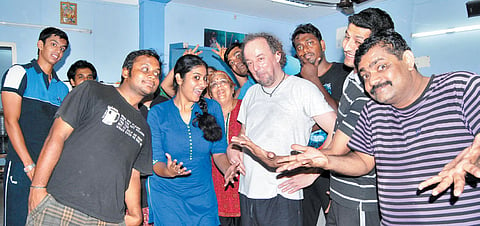

The world of physical theatre is a very confusing one to navigate, not to mention intensive and concentration-heavy. While some think physical theatre is all about being ‘physical’ on stage, British academic, teacher and theatre artiste John Britton debunks that theory. “It doesn’t really mean anything,” he says in his thick British accent. “In Australia, it means the circus. Some think it’s about having no props on the stage,” he says.
The veteran artiste has been in Chennai for the past two weeks, teaching the nuances of physical theatre to young members of Tamil theatre group, Shraddha. The artistic director of DUENDE, an international collaboration of performers, has been travelling around the country, conducting workshops and residencies in both physical theatre and dance drama. “Physical theatre is a form of performance where the primary vehicle of expression is your body. It’s not the music, text or the props,” he explains.
The body-as-theatre concept developed sometime in the late 1980s in England, says Britton. “It’s all about body language. When you’re on stage, you obviously have to concentrate on your lines and all that, but you need to be aware of what your body is doing too. You don’t want to go on stage and hear text. You want to see a performance and that’s what physical theatre enables you to do,” says Britton.
At Shraddha, Britton has been trying to encourage performers to have a deeper awareness of their own body and the means to be able to control what one’s body is doing on stage while delivering dialogue. Britton adds that this is something that Indian theatre artistes lack. “They have great depth and the precise ability to tell a story but they do not have versatility. It’s the opposite with western artistes — they can do a lot of things, but they cannot tell what is needed to be told on stage. I think that’s where we can work together and learn from each other,” he says.